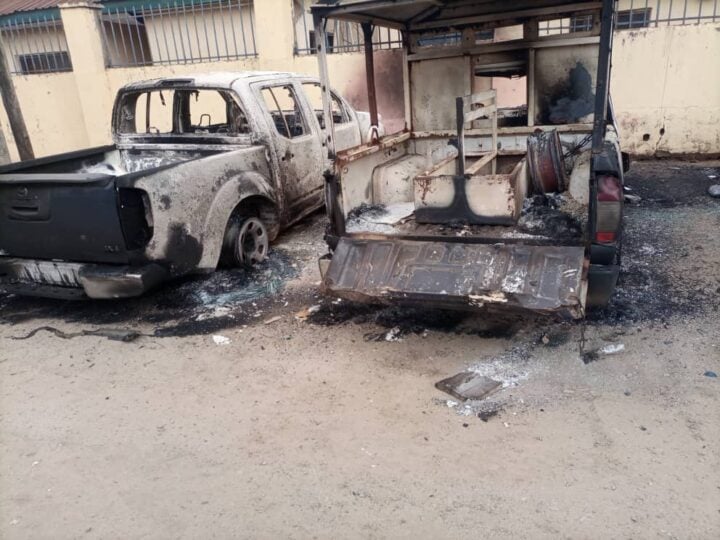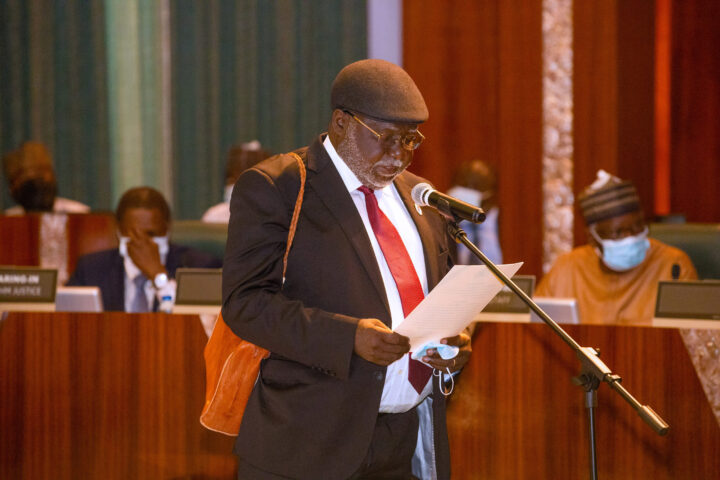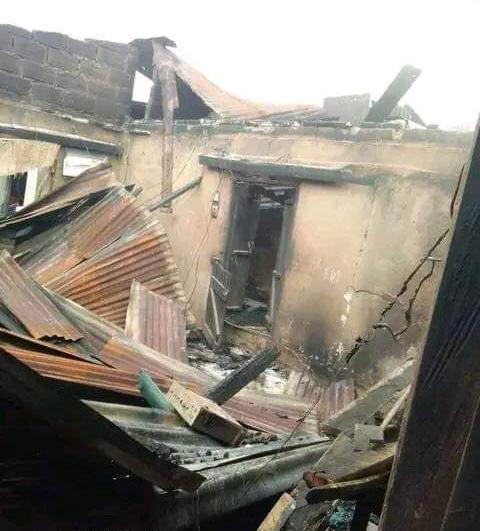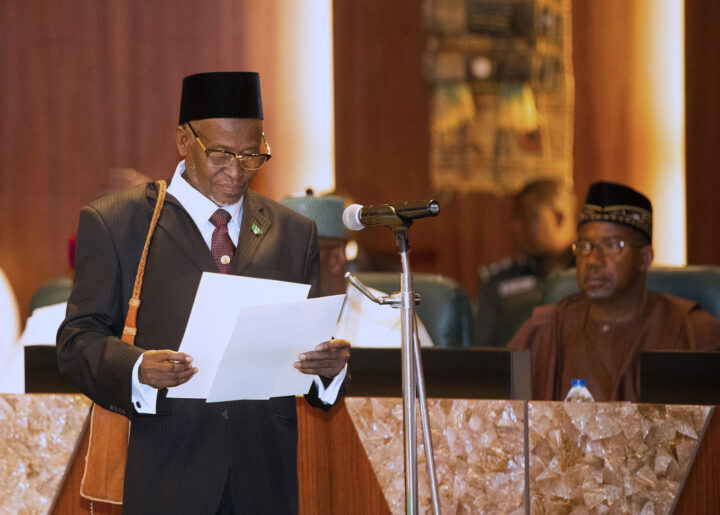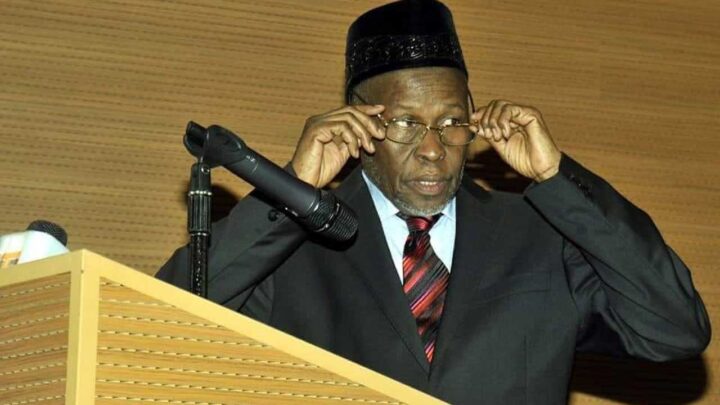For many years, south-east Nigeria was considered the safest geopolitical zone in the country. The five states — Abia, Anambra, Ebonyi, Enugu, and Imo — that form the zone had recorded the least spate of violent attacks in comparison with other parts of the country.
For instance, in its 2019 report, Nigeria Mourns said the south-east recorded the least number of reported killings with 94 deaths, while the south-west recorded 157 deaths, followed by south-south with 341 deaths. North-central recorded 469 deaths and the north-east had 1009 while north-west had the highest with 1,118 deaths.
However, with renewed secessionist agitations by the Indigenous People of Biafra (IPOB), which have turned radical and violent, as well as the government’s countermeasures, security in the region has deteriorated.
Amid growing concerns about the violence and kidnappings associated with bandits and rogue herders, IPOB’s leader, Nnamdi Kanu, who is now facing criminal charges, said the group needed to protect the south-east and launched a security outfit named the Eastern Security Network (ESN) on December 13, 2020.
Advertisement
Emma Powerful, IPOB’s spokesman, had said the objective of the network is to protect the south-east from “criminal activity”, adding that ESN is a replica of Amotekun, a security outfit established by the governors of the south-west to curb insecurity in that geopolitical zone. But ESN has been blamed for escalating attacks on civilians and government facilities and security personnel in the south-east.
Despite the launch of ESN purportedly to ensure security, recent data from Council on Foreign Relations (CFR) and media reports show that killings in the south-east rose by 555.7 percent between 2020 and 2021.
Media reports of violent attacks collated by CFR and other media platforms were analysed to ascertain the number of killings in the south-east. The analysis was from January 1, 2020, to December 12, 2021. Reported killings associated with domestic violence and mob justice were excluded.
Advertisement
Based on the data obtained, the south-east recorded 97 deaths in reported violent attacks between January 1, 2020 and December 12, 2020, while 636 deaths were recorded in reported violent attacks between December 13, 2020, and December 12, 2021.
IMO STATE — EPICENTRE OF KILLINGS IN SOUTH-EAST
Imo state recorded the highest number of fatalities with 208 deaths, representing 32.7 percent of the total figure within one year. Imo was followed by Anambra with 187 deaths, Ebonyi recorded 103 deaths, followed by Abia with 70 deaths, and Enugu recorded 68 deaths.
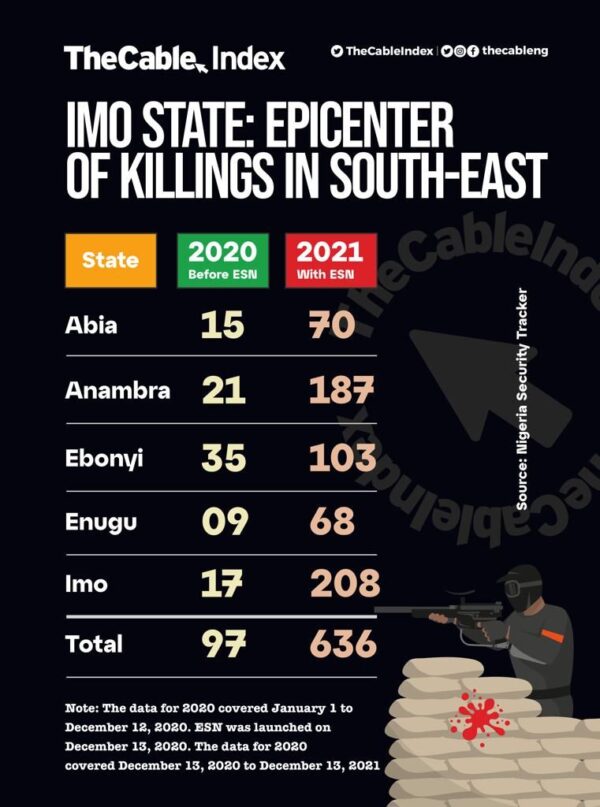
Advertisement
Imo has been the scene of some of the most audacious attacks targeting state security facilities and personnel in the region. On April 5, 2021, gunmen attacked the Imo police headquarters and correctional service. According to authorities, the gunmen freed at least 1,844 inmates during the attack and also looted the police armoury.
Reacting to the incident, Mohammed Adamu, the then inspector-general of police, had accused IPOB’s armed unit – ESN – of being culpable. Some hours after the attack, Kanu, IPOB’s leader, posted a tweet saying nobody deserves to be in a prison in Nigeria.
“If Miyetti Allah terror herdsmen & other murderous #Fulani groups, including Boko Haram insurgents, can be arrested, freed and rehabilitated by this neo-colonial Fulanised @NGRPresident, then no single soul deserves to be in any prison in Nigeria. If you know you know! #UGM,” Kanu tweeted, appearing to declare his approval for the coordinated attacks.
However, IPOB denied involvement in the incident, saying it is not in the group’s mandate to attack security personnel and prisons.
Advertisement
“Unknown gunmen are different people which we don’t know and they are not IPOB or ESN security outfit,” IPOB spokesperson had said. Gunmen unleashing deadly attacks in the region are described as “unknown gunmen” in the media and public discourses. But many believe the so-called unknown gunmen are ESN/IPOB operatives, drawn from dissatisfied youth in the zone where unemployment and feelings of marginalisation are widespread.
46 STATIONS ATTACKED, 103 OFFICERS KILLED IN ONE YEAR
Advertisement
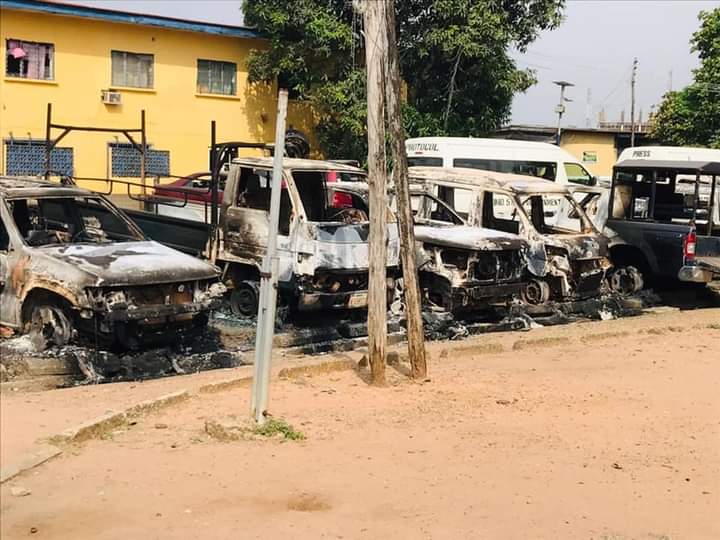
The spate of violent attacks on police officers and their facilities also skyrocketed in the period under review. In 2020, not less than 11 police officers were reported to have been killed in the south-east. Majority of the attacks occurred during the violence that trailed the October 20, 2020 #EndSARS protest.
Subsequently, 46 police stations and eight police checkpoints were reported to have been attacked in the geopolitical zone in 2021. Within that period, 103 police officers were reported to have been murdered in a series of violent attacks. Offices of the Independent National Electoral Commission (INEC) and other government assets were also attacked.
Advertisement
‘USE OF FORCE COMPLICATED THE SITUATION’
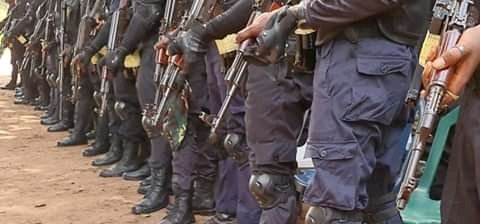
Advertisement
Freedom Onuorah, a security expert, blames the “dramatic deterioration of security in the south-east” on the activities of IPOB/ESN.
He said ESN was set up to combat activities of “herdsmen” allegedly responsible for the attacks on rural communities — but the use of force against the outfit by security operatives and designation of IPOB as a terrorist group complicated the situation.
He said the attack on the Imo prison triggered the regrouping of former criminals.
“The emergence of the Eastern Security Network (ESN) of the IPOB is implicated in the raiding of some forest to confront some Fulani herdsmen allegedly responsible for the attacks on rural communities in the south-east,” Onuorah said. “However, the manner in which federal security forces went after the ESN complicated the situation as it became difficult to identify the ESN group and their command structure.”
The security expert submitted that the continuation of the sit-at-home in the south-east despite its suspension by IPOB shows the group has “lost control” of its men in the zone.
He suggested that the federal government should dialogue with IPOB and seek a “negotiated settlement” for Kanu who is currently in the custody of the Department of State Security (DSS).
He further encouraged south-east governors to set up a “robust regional” security outfit that will prioritise the activation of community-driven early warning system, and enhanced identification of residents or visitors.
‘INTELLIGENCE-DRIVEN STRATEGY’
Ikenga Tochukwu, the Anambra police spokesperson, agreed that the south-east, including Anambra, is experiencing rising insecurity.
When presented with the data findings, Tochukwu said the security situation should not be “sensationalised”, adding that the Anambra police command is addressing the insecurity with “community-driven intelligence”.
“Don’t let us be sensational about this. Yes, we have a security situation in the south-east, including Anambra state. We are addressing it and I can tell you that right now our strategies are intelligence-driven,” he said.
‘FG CAUSED INSECURITY IN SOUTH-EAST’

Powerful, IPOB spokesperson, believes the federal government “sponsored” criminal elements committing atrocities in the zone — a claim he was unable to back with evidence.
He argued that the mandate of ESN is to secure farmlands and forests, adding that the government was intimidated by the formation of the security outfit.
“We observed the same skyrocketing of crime within the south-east no doubt and the answer is not far-fetched,” the spokesperson said.
“The Nigeria government was perplexed and scared upon the unveiling of a few batches of ESN volunteers by Mazi Nnamdi Kanu and they immediately sponsored criminals, cultists to commit all manner of atrocities in the south-east.
“The ESN that you hear of are not criminals, these are educated youths, most of whom are professionals in various fields, experts and authorities in their chosen professions, some are abroad, and some of them also resigned from this current government regime.”
This report was produced under the 2022 Dataphyte fellowship.
Additional reporting from Ayodele Oluwafemi.
Add a comment
